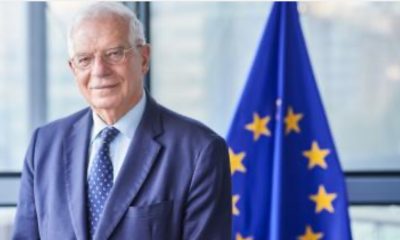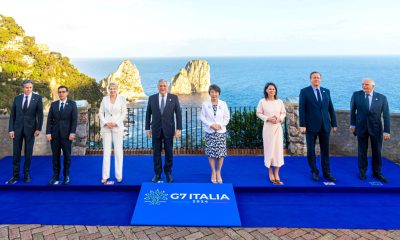Iran
Kundiges dring daarop aan dat die kultuur van straffeloosheid in Iran beëindig word, en dat verantwoording gedoen moet word vir leiers van die regime, insluitend Raisi

In an online conference held on 24 June by the National Council of Resistance of Iran (NCRI), human rights experts and jurists discussed the implications of Ebrahim Raisi as the Iranian regime’s president. They also weighed in on the role that the international community must play to end Tehran's culture of impunity for criminals and to hold the regime’s authorities to account for their past and ongoing crimes, skryf Shahin Gobadi.
The panelists included former UN appeal judge and President of the War Crimes Court in Sierra Leone Geoffrey Robertson, President Emeritus of the Law Society of England and Wales Nicholas Fluck, former US national security official Ambassador Lincoln Bloomfield Jr., former Chief of the UN Human Rights Office in Iraq Tahar Boumedra, and a survivor of the 1988 massacre Reza Fallahi.
The outcome of the 18 June sham presidential election in Iran was the selection of Raisi as the regime’s next president. The international community reacted with outrage, mostly due to Raisi’s direct role in the 1988 massacre of over 30,000 political prisoners across the country. Raisi was a member of the four-man 'Death Committee' responsible for the heinous mass murder. The overwhelming majority of the victims were supporters of the principal opposition movement, the Mujahedin-e Khalq (MEK).
The regime’s elections charade also faced an unprecedented and massive nationwide boycott by the overwhelming majority of the Iranian people. Through their resounding boycott, the Iranian people made it clear that they seek nothing less than regime change in Iran at their own hands.
Ali Safavi, a member of the Foreign Affairs Committee of the NCRI, and the moderator of the Thursday event, said the Iranian people have dubbed Raisi "the henchman of the 1988 massacre."
The ascendance to the presidency of one of the worst criminals in modern history, he added, was a decision made by the mullahs' Supreme Leader Ali Khamenei out of utter desperation and because he faces a society on the verge of explosion, with more popular uprisings looming on the horizon.
Safavi also rejected the myth of moderation in Tehran and added: "Raisi’s ascension also put an end to the fallacious ‘moderate vs hardliner’ narrative, which the Iranian people had debunked in their chants of ‘Reformer, hardliner, the game is now over’ during the four nationwide uprisings since 2017."
Prominent international human rights expert and jurist Geoffrey Robertson said, "We now have an international criminal as president of the state of Iran. ... What I have evidence of is that Raisi, with two other colleagues, on numerous occasions sent people to their deaths without a proper or indeed any trial process. And that involves him in a crime against humanity."
He said Raisi's presidency "focuses attention on this barbaric moment in world history that has been overlooked," calling the 1988 massacre as "indeed one of the greatest crimes against humanity, certainly the greatest committed against prisoners since the Second World War."
With respect to the role of the United Nations, Mr. Robertson said: "The United Nations has a bad conscience over this. At the time Amnesty International alerted about the massacre throughout Iran, but the UN turned a blind eye on the matter."
"The UN has a duty to set up a proper inquiry into these barbaric doings of 1988."
Mr. Robertson also raised the potential for the application of the Magnitsky sanctions in Europe vis-a-vis Raisi and other officials complicit in the 1988 massacre. Responding to questions about Raisi's immunity from trial as a head of state, Mr. Robertson said that "a crime against humanity and the need to end impunity by punishing it trumps any immunity."
Nick Fluck, President Emeritus of the Law Society of England and Wales, said: "Raisi said on record that he was proud of his role in the massacre of political prisoners. This should serve as an important wakeup call for all of us. We cannot sit silent on the sidelines."
He added: "It appears that the death committee was simply performing a clean up operation [in 1988] to remove people who were vociferous against the regime."
Mr. Fluck also said: "I applaud the efforts and the diligence and the persuasiveness of the NCRI" with respect to calling for investigations into the 1988 massacre.
Speaking from Washington, D.C., Ambassador Lincoln Bloomfield, Jr., said, "The West has failed to face the reality. The founder of the regime, Ayatollah Khomeini, and his successor, the current Supreme Leader Ali Khamenei, are both gross violators of human rights. They are responsible for directing major acts of international terrorism on foreign soil."
Referring to the fact that there are no differences between so-called "moderates" and "hardliners" in the regime, Amb. Bloomfield said, "Since 2017, under the so-called moderate president Rouhani, Raisi has been putting people in jail. Raisi’s role has continued since the 1988 massacre right before our eyes."
Reminding of the observation that "human rights are a central focus of President Biden's message to the world," Amb. Bloomfield recommended: "The United States and others must pursue human rights cases not only against Raisi but against everyone in the regime."
"There should also be a counter intelligence investigation in America to make sure that people who are speaking on behalf of Iran [regime] are identified with their connection with the regime," he concluded.
A survivor of the 1988 massacre also spoke at the event. Reza Fallahi, who miraculously escaped the killings and now resides in Britain, recounted a horrifying personal ordeal beginning with his September 1981 arrest for supporting the MEK. He reminded that the planning for the massacre began "in late 1987 and early 1988".
He added with regards to Raisi's role: "Ebrahim Raisi displayed particular hostility towards myself and my cellmates. ... They asked about our affiliation with any political organization, if we believe in the Islamic Republic, and if we are willing to repent, and so on. ... Overall, only 12 people survived in our ward."
He added, "To stop the regime from committing another massacre, the international community, in particular the United Nations, must end the culture of impunity, launch an independent investigation into the massacre, and bring people like Raisi to account."
Fallahi also announced that families of the victims will file a complaint against Raisi in the UK.
"Will western countries and the United Nations remain silent like they did during the 1988 massacre?" asked the massacre survivor.
Tahar Boumedra, former chief of the UN Human Rights Office in Iraq and Coordinator of the Justice for the Victims of the 1988 Massacre in Iran (JVMI), said: "JVMI is joining its voice with Amnesty International, and we are calling for Ebrahim Raisi to be investigated for his role in past and ongoing crimes against humanity, and for international tribunals to bring him to justice."
"We are not going to wait until immunity is removed from Raisi in order to act. We are going to act, and we are going to put this to the British system."
Boumedra said: "JVMI has documented a large amount of evidence and it will be delivered to concerned authorities," before adding, "We strongly believe that Raisi’s place is not to run a state or be a president. His place is in a detention facility at The Hague," referring to the seat of the International Court of Justice.
Deel hierdie artikel:
-

 Konferensies4 dae gelede
Konferensies4 dae geledeNatCon se aan-af-konferensie is deur die Brusselse polisie gestaak
-

 massa toesig5 dae gelede
massa toesig5 dae geledeLek: EU-ministers van binnelandse sake wil hulself vrystel van kletsbeheer grootmaat skandering van private boodskappe
-

 Konferensies5 dae gelede
Konferensies5 dae geledeNatCon-konferensie gaan voort by die nuwe Brusselse lokaal
-

 Europese Buitelandse Aksiediens (EAAS)5 dae gelede
Europese Buitelandse Aksiediens (EAAS)5 dae geledeBorrell skryf sy posbeskrywing


























